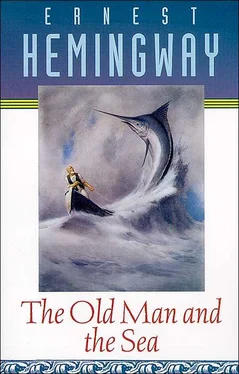He also drank a cup of shark liver oil each day from the big drum in the shack where many of the fishermen kept their gear. It was there for all fishermen who wanted it. Most fishermen hated the taste. But it was no worse than getting up at the hours that they rose and it was very good against all colds and grippes and it was good for the eyes.
Now the old man looked up and saw that the bird was circling again.
“He’s found fish,” he said aloud. No flying fish broke the surface and there was no scattering of bait fish. But as the old man watched, a small tuna rose in the air, turned and dropped head first into the water. The tuna shone silver in the sun and after he had dropped back into the water another and another rose and they were jumping in all directions, churning the water and leaping in long jumps after the bait. They were circling it and driving it.
If they don’t travel too fast I will get into them, the old man thought, and he watched the school working the water white and the bird now dropping and dipping into the bait fish that were forced to the surface in their panic.
“The bird is a great help,” the old man said. Just then the stern line came taut under his foot, where he had kept a loop of the line, and he dropped his oars and felt tile weight of the small tuna’s shivering pull as he held the line firm and commenced to haul it in. The shivering increased as he pulled in and he could see the blue back of the fish in the water and the gold of his sides before he swung him over the side and into the boat. He lay in the stern in the sun, compact and bullet shaped, his big, unintelligent eyes staring as he thumped his life out against the planking of the boat with the quick shivering strokes of his neat, fast-moving tail. The old man hit him on the head for kindness and kicked him, his body still shuddering, under the shade of the stern.
“Albacore,” he said aloud. “He’ll make a beautiful bait. He’ll weigh ten pounds.”
He did not remember when he had first started to talk aloud when he was by himself. He had sung when he was by himself in the old days and he had sung at night sometimes when he was alone steering on his watch in the smacks or in the turtle boats. He had probably started to talk aloud, when alone, when the boy had left. But he did not remember. When he and the boy fished together they usually spoke only when it was necessary. They talked at night or when they were storm-bound by bad weather. It was considered a virtue not to talk unnecessarily at sea and the old man had always considered it so and respected it. But now he said his thoughts aloud many times since there was no one that they could annoy.
“If the others heard me talking out loud they would think that I am crazy,” he said aloud. “But since I am not crazy, I do not care. And the rich have radios to talk to them in their boats and to bring them the baseball.”
Now is no time to think of baseball, he thought. Now is the time to think of only one thing. That which I was born for. There might be a big one around that school, he thought. I picked up only a straggler from the albacore that were feeding. But they are working far out and fast. Everything that shows on the surface today travels very fast and to the north-east. Can that be the time of day? Or is it some sign of weather that I do not know?
He could not see the green of the shore now but only the tops of the blue hills that showed white as though they were snow-capped and the clouds that looked like high snow mountains above them. The sea was very dark and the light made prisms in the water. The myriad flecks of the plankton were annulled now by the high sun and it was only the great deep prisms in the blue water that the old man saw now with his lines going straight down into the water that was a mile deep.
The tuna, the fishermen called all the fish of that species tuna and only distinguished among them by their proper names when they came to sell them or to trade them for baits, were down again. The sun was hot now and the old man felt it on the back of his neck and felt the sweat trickle down his back as he rowed.
I could just drift, he thought, and sleep and put a bight of line around my toe to wake me. But today is eighty-five days and I should fish the day well.
Just then, watching his lines, he saw one of the projecting green sticks dip sharply.
“Yes,” he said. “Yes,” and shipped his oars without bumping the boat. He reached out for the line and held it softly between the thumb and forefinger of his right hand. He felt no strain nor weight and he held the line lightly. Then it came again. This time it was a tentative pull, not solid nor heavy, and he knew exactly what it was. One hundred fathoms down a marlin was eating the sardines that covered the point and the shank of the hook where the hand-forged hook projected from the head of the small tuna.
The old man held the line delicately, and softly, with his left hand, unleashed it from the stick. Now he could let it run through his fingers without the fish feeling any tension.
This far out, he must be huge in this month, he thought. Eat them, fish. Eat them. Please eat them.
How fresh they are and you down there six hundred feet in that cold water in the dark. Make another turn in the dark and come back and eat them.
He felt the light delicate pulling and then a harder pull when a sardine’s head must have been more difficult to break from the hook. Then there was nothing.
“Come on,” the old man said aloud. “Make another turn. Just smell them. Aren’t they lovely? Eat them good now and then there is the tuna. Hard and cold and lovely. Don’t be shy, fish. Eat them.”
He waited with the line between his thumb and his finger, watching it and the other lines at the same time for the fish might have swum up or down. Then came the same delicate pulling touch again.
“He’ll take it,” the old man said aloud. “God help him to take it.”
He did not take it though. He was gone and the old man felt nothing.
“He can’t have gone,” he said. “Christ knows he can’t have gone. He’s making a turn. Maybe he has been hooked before and he remembers something of it.
Then he felt the gentle touch on the line and he was happy.
“It was only his turn,” he said. “He’ll take it.”
He was happy feeling the gentle pulling and then he felt something hard and unbelievably heavy. It was the weight of the fish and he let the line slip down, down, down, unrolling off the first of the two reserve coils. As it went down, slipping lightly through the old man’s fingers, he still could feel the great weight, though the pressure of his thumb and finger were almost imperceptible.
“What a fish,” he said. “He has it sideways in his mouth now and he is moving off with it.”
Then he will turn and swallow it, he thought. He did not say that because he knew that if you said a good thing it might not happen. He knew what a huge fish this was and he thought of him moving away in the darkness with the tuna held crosswise in his mouth. At that moment he felt him stop moving but the weight was still there. Then the weight increased and he gave more line. He tightened the pressure of his thumb and finger for a moment and the weight increased and was going straight down.
“He’s taken it,” he said. “Now I’ll let him eat it well.”
He let the line slip through his fingers while he reached down with his left hand and made fast the free end of the two reserve coils to the loop of the two reserve coils of the next line. Now he was ready. He had three forty-fathom coils of line in reserve now, as well as the coil he was using.
“Eat it a little more,” he said. “Eat it well.”
Eat it so that the point of the hook goes into your heart and kills you, he thought. Come up easy and let me put the harpoon into you. All right. Are you ready? Have you been long enough at table?
Читать дальше












